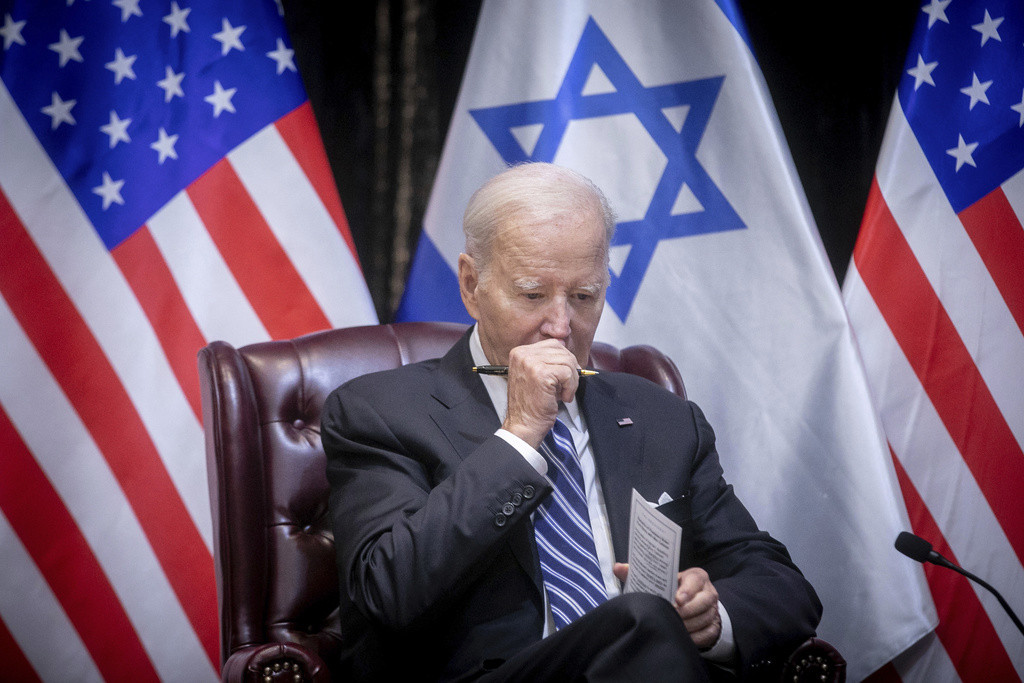

The war in Gaza has rocked the Biden administration to the core, pushing the president to adopt ever-changing positions as President Joe Biden attempts to balance his different voting blocs.
After a strong show of support for Israel in the immediate aftermath of Hamas’s Oct. 7, 2023, surprise attack against the Jewish state, Biden has steadily soured on his support for Israel amid revolts from his supporters and some within his administration. His changing view culminated in a direct threat to withhold weapons if the Israel Defense Forces invaded Rafah, drawing outrage from supporters of Israel.
Here is a timeline of Biden’s changing attitudes toward Israel.
On Oct. 7, 2023, hundreds of Hamas fighters launched a surprise attack against Israel, invading border villages and killing 1,200 Israelis, most of them civilians. More than 250 people were kidnapped and taken to Gaza as hostages.
While the true scale of the attacks and brutality involved was not immediately apparent, a transcript of Biden’s conversation with special counsel Robert Hur on the day of the attacks revealed that he believed the attacks to be a world-changing event. In a phone call with Israeli Prime Minister Benjamin Netanyahu, Biden affirmed his support for Israel and any actions it might take to defend itself.
“I made clear to Prime Minister Netanyahu that we stand ready to offer all appropriate means of support to the government and people of Israel,” Biden said in a written statement after the call.
The president affirmed Israel’s right to take military action to defend itself in later remarks.
“Israel has a right to defend itself and its people — full stop,” he said. “Let me say this as clearly as I can: This is not a moment for any party hostile to Israel to exploit these attacks to seek advantage. The world is watching.”
Visiting Israel later that month, Biden gave an address expressing his support for Israel on Oct. 17, decrying the Oct. 7 attacks as “like 15 9/11s.” He pledged that the United States would do everything in its power to ensure the protection of Israel, and to pass an “unprecedented support package for Israel’s defense.”
However, in a sign of things to come, he also warned Israel against overreacting, using the U.S. reaction to the Sept. 11, 2001, terrorist attacks as a cautionary tale.
“But I caution this: While you feel that rage, don’t be consumed by it,” Biden said. “After 9/11, we were enraged in the United States. And while we sought justice and got justice, we also made mistakes.
“You are a Jewish state,” he added. “You are a Jewish state, but you’re also a democracy. And like the United States, you don’t live by the rules of terrorists. You live by the rule of law. And when conflicts flare, you live by the law of wars.”
Israel had begun an intensive bombing campaign on Gaza by the time of his address, drawing the beginning of increasingly intensifying criticism of Israel’s actions from many in the Democratic Party.
Readouts of calls between Biden and Netanyahu in November and December 2023 reflected growing stress on the humanitarian needs of Gazans and warnings about settler violence in the West Bank. Shadows of growing concerns were shown in January readouts, including one uniquely phrased sentence that appeared to show Biden lecturing Netanyahu on Israel’s responsibilities in war.
“The President discussed Israel’s responsibility even as it maintains military pressure on Hamas and its leaders to reduce civilian harm and protect the innocent,” a Jan. 19 readout said.
Despite this, readouts continued to reaffirm Biden’s support for Israel, particularly efforts to secure the release of the remaining hostages held by Hamas.
In February, reports began to emerge detailing growing private outrage from Biden regarding Israel’s actions, which began to seep into restrained public outrage.
On Feb. 8, he decried Israel’s actions in Gaza as “over the top,” his strongest rebuke of Israel to that point.
On Feb. 11, the Washington Post published a report based on interviews with administration officials detailing the boiling tension between Biden and Netanyahu, with many in the administration concluding that the Israeli prime minister was no longer a reliable partner.
He also began expressing his support for a ceasefire, a prospect sharply rejected early in the war. By this time, operations in northern and central Gaza began to wind down, and Israel began to prepare for an invasion of the final enclave in Rafah.
“I’ve made the case, and I feel very strongly about it that there has to be a temporary ceasefire to get the prisoners out, the hostages out, and that is still underway,” he said later in February. “I’m hopeful that can be done, and in the meantime, I don’t anticipate, I’m hoping that the Israelis will not make any massive land invasion in the meantime. So it’s my expectation that does not happen.”
Throughout March, tensions boiled over between Israel and the U.S. as the humanitarian situation worsened and as Israel continued to push for a Rafah invasion despite U.S. opposition.
“They also discussed the humanitarian crisis in Gaza,” a March 18 readout read. “The President stressed the urgent need to significantly increase the flow of lifesaving aid reaching those in need throughout Gaza, with special emphasis on the north. The President reiterated his deep concerns about the prospect of Israel conducting a major ground operation in Rafah, where more than one million displaced civilians are currently seeking shelter after fleeing fighting in the north.”
On April 1, a convoy of aid workers with the World Central Kitchen was hit three separate times by an Israeli drone, killing seven of them. The incident drew international outrage, resulting in unprecedented criticism from Biden.
In a phone call three days later, Biden told Netanyahu that the U.S.’s patience had run out and that Israel must do more to get aid to Gazan civilians.
“President Biden emphasized that the strikes on humanitarian workers and the overall humanitarian situation are unacceptable,” a readout of the call said. “He made clear the need for Israel to announce and implement a series of specific, concrete, and measurable steps to address civilian harm, humanitarian suffering, and the safety of aid workers. He made clear that U.S. policy with respect to Gaza will be determined by our assessment of Israel’s immediate action on these steps.”
Relations between the Biden administration and Israel saw a brief boon in April when Iran launched a massive missile strike against Israel in retaliation for an Israeli airstrike on the Iranian Embassy in Damascus, Syria, which killed several Islamic Revolutionary Guards Corps leaders.
The U.S. closely coordinated with Israel in defending against the attack. Biden issued a statement reaffirming the U.S.’s support for Israel in its wake.
“I’ve just spoken with Prime Minister Netanyahu to reaffirm America’s ironclad commitment to the security of Israel,” the statement read. “I told him that Israel demonstrated a remarkable capacity to defend against and defeat even unprecedented attacks – sending a clear message to its foes that they cannot effectively threaten the security of Israel.”
Progressive Democrats had been staging protests against Israel’s conduct since the beginning of the war, but they reached new heights in April when activists began to set up encampments on university campuses. Two of the most visible were at Columbia University and the University of California, Los Angeles. Riot police stormed the campuses after violence erupted, including the seizure and occupation of a campus building at Columbia.
Netanyahu personally spoke out against the protesters, calling them antisemitic and comparing them to the Nazis. While not mentioning Biden, the Israeli prime minister positioned himself largely on the side of Republicans, who had led the movement condemning the protesters. Several leading Republicans praised Netanyahu’s remarks, while Biden remained silent.
Biden, for his part, denounced the excesses of the protests, while also defending the rights of students to peacefully protest.
“Violent protest is not protected,” he said. “Peaceful protest is. It’s against the law when violence occurs. Destroying property is not a peaceful protest. It’s against the law. Vandalism, trespassing, breaking windows, shutting down campuses, forcing the cancellation of classes and graduations — None of this is a peaceful protest. Threatening people, intimidating people, instilling fear in people is not peaceful protest.”
Biden’s frustration with Israel finally boiled over on Wednesday, when he announced he would cut off offensive arm shipments to Israel if it went ahead with plans for a ground invasion of Rafah.
“Civilians have been killed in Gaza as a consequence of those bombs and other ways in which they go after population centers,” Biden told CNN.
“I made it clear that if they go into Rafah — they haven’t gone in Rafah yet — if they go into Rafah, I’m not supplying the weapons that have been used historically to deal with Rafah, to deal with the cities, that deal with that problem,” he added.
By the time he made his remarks, Israel had already begun its offensive into Rafah, cutting off the border crossing. It is unclear what Biden would consider “going into Rafah.”
CLICK HERE TO READ MORE FROM THE WASHINGTON EXAMINER
Instead of providing a new statement, Netanyahu reposted a days-old speech vowing not to cave to international pressure.
“Today, we again confront enemies bent on our destruction,” Netanyahu said during the speech he gave at a Holocaust Remembrance Day event in Jerusalem days ago. “I say to the leaders of the world: No amount of pressure, no decision from any international forum, will stop Israel from defending itself.”

![[GOOD PRESS] ON](https://georgemagazine.com/wp-content/uploads/2024/08/16389056566437433941_2048-300x300.jpeg)

